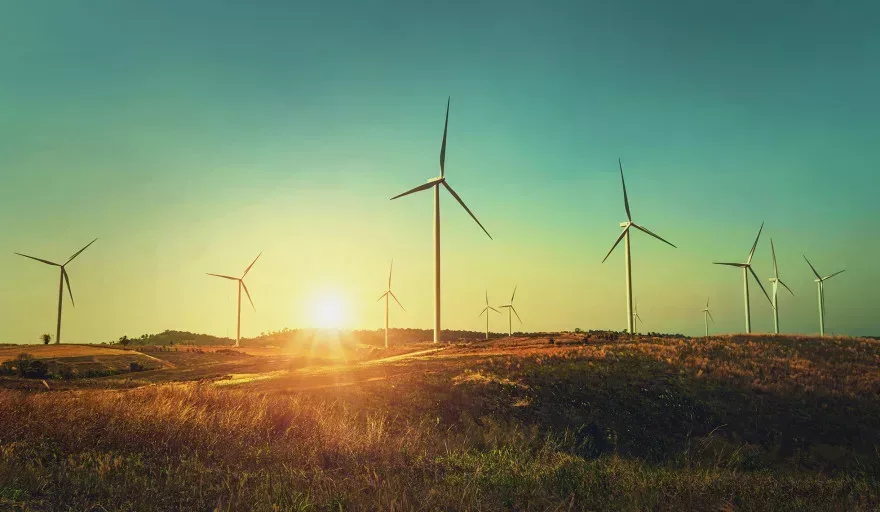A key organization in the effort to combat climate change, we speak to Amy Davidsen, Executive Director of North America at Climate Group, about working alongside governments to help regions and companies reach green goals.
INTRODUCTION
Today, the planet exists on the periphery of global change.
Despite it still being early days for the 2020s, the decade has already become recognized for both dramatic political events as well as the collective shock of the COVID-19 pandemic. Yet above all these 2020-specific happenings, the decade has also been highlighted by scientific experts as the turning point for climate change. In recognition of this environmental need, many have come to regard the present as the Climate Decade – a string of years during which we have a chance to cap global warming at 1.5°C and reverse global emissions to avoid disastrous effects on the environment.
“We are seeing the accelerating impacts of a warming planet reshaping our life on Earth,” says Amy Davidsen, Executive Director of North America at the Climate Group. “From historic temperature heights in Siberia, extreme flooding in Germany, Switzerland and China, and another season of western US wildfires, the negative effects of climate change are apparent.
“If we are to increase our change of securing a habitable planet for future generations, we must act rapidly to cut global emissions in half by 2030. This is the challenge of our time, and yet I am hopeful because the opportunities for impact and innovation are endless. Inaction will be a much heavier economic and social burden than action, and many companies are stepping up with increased commitments and resources in recognition of this. However, we need much more engagement across all sectors of the economy to achieve this goal.”
The Climate Group is an international non-profit organization with headquarters in London, and offices in New Delhi and New York. The organization’s mission is to drive action against climate change swiftly and achieve the global goal of net zero carbon emissions by no later than 2050.
“Our global staff support and form influential networks made up of businesses and subnational governments with the aim of shifting global markets and policies to move entire sectors, such as energy, transport and construction, into a cleaner future,” Davidsen tells us.
According to Davidsen, this future requires radical collaboration between sectors and non-profit organizations, and because of this, the Climate Group views its fellow environmental NGOs (non-governmental organizations) as partners rather than competitors. For the Climate Group, the reality of the climate crisis is one that no single group can solve, and it falls to continued ambitious collective action to make impactful progress across the globe, for the globe.
MULTITIERED COLLABORATION
All of the Climate Group’s work addresses critical areas for climate action with a core focus on clean energy transition. Through its initiatives the organization encourages companies to make the switch to renewables, electric transport and increased energy efficiency in the shortest timeframe possible, and no later than 2050.
“To help companies on their journey, we highlight key milestones of achievement towards their goal and offer technical support, peer-to-peer learning webinars, networking events, and in person meetings,” Davidsen explains. “Some of our recent work to date includes our transport initiatives, like EV100 and RouteZero, as well as our network of subnational governments in the Under2 Coalition.
“The transport sector is the fastest-growing contributor to climate change, accounting for approximately 23 percent of global emissions. Our initiative, EV100, brings together a global group of businesses committed to electrifying their fleets or installing EV charging company-wide by 2030. Businesses are the biggest single buyers of cars and commercial vehicles and present a significant opportunity to reduce carbon pollution and improve local air quality and health. EV100 has over 110 members globally including Siemens and DHL who have collectively committed to electrify over five million vehicles by 2030.”
The Climate Group is also the Secretariat to the Under2 Coalition, a group of ambitious state and regional governments committed to keeping global temperature rise to well below 2°C. As a result of action in 2021, the Under2 Coalition brings together 260 governments representing 1.75 billion people and 50 percent of the global economy. Through the coalition, states and regions are setting more ambitious goals, delivering on critical areas like transport emissions and renewable energy, and increasing their influence on the global climate agenda.
A GREEN DECADE
According to Davidsen, 2021 has been a critical year given that, for the first time, there has been alignment between climate leaders within the US Administration, subnational governments, and businesses. This represents a key window of opportunity through which organizations can secure climate smart policies at a federal level to help support the goals and ambitions of a net zero future.
“We also want to support a successful COP26 which was delayed last year due to the COVID-19 pandemic,” she elaborates. “Through our global network, we will show what is possible through real economic examples of businesses and states that transitioning to lower costing clean energy and transportation not only boosts their economy and creates jobs but also improves the health and lives of people.”
But for the Climate Group, the most urgent issue that must be addressed is the need for a 50 percent reduction of global greenhouse gases by 2030. It is clear that this cannot be accomplished without greater energy efficiency, the rapid deployment of clean energy and clean transportation. Because of this fact, the organization is continuing its drive of the adoption of renewables and supportive policies in the US in order to accelerate the transition, and at the same time working to create a tipping point for the EV market so that clean energy cars are accessible across the country.
“Over the next year and beyond, we will continue to work with subnational governments to scale their commitments and action that are in line with viable net zero pathways for the betterment of the world tomorrow.”

































